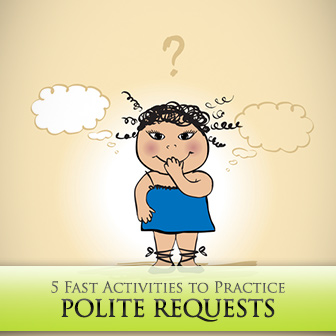How To Teach Polite Phrases: 3 Secret Ingredients


Write this proverb on the board and talk about what they think it means, then tell them the real meaning. Do your students have similar phrases in their native languages? Give your students a chance to share their thoughts. Then move into the topic of making polite requests. Polite requests are useful for setting people at ease and still getting the assistance you need. Different cultures make polite requests using different tools, and English is no exception. Here are the basics of making polite requests in English and some in class activities you can use for practice.

The most common way of making a polite request is using the modals ‘could’ and ‘would’. Could you do me a favor? Would you pass the salt? These are simple grammatical structures for polite requests. Show your students how these words make a potentially offensive command (Come here!) into a polite request. (Could you come here?) Let your students practice these constructions with the activities explained below.
Once your students are comfortable with the simple could/would request constructions, introduce other means of making a polite request. You should include the following phrases. You may want to focus on using these phrases in one or more of your in class request activities.
Please…
I’d like…
Do you mind…
May I…
Shall we…
With your students, make a list of 10 to 20 items in the room. If possible, write the items on small slips of paper and put them in a hat; you will then use them for this fun and competitive game. Divide your class into two teams. For each round of the game, have one student from each team come to the front of the room. One person draws an object from the hat. The two students then take turns making requests related to that object and using that object in the sentence. For example, if the object is pencil, students may ask questions like the following: Could I borrow a pencil? Would you mind lending me a pencil? Could you hand me that pencil? Etc. When a student can no longer think of a request associated with the object, the round is over and the other team scores a point. Once you have gone through all the items on the list, the team with the most points scores. This is not only a great way of practicing polite requests; it is also a fun way of reviewing vocabulary.
Have your students practice using polite requests with this inverted 20-questions style game. Each person thinks of a location. It can be anything from the ordinary (like a library) to the extraordinary (like the inside of a volcano). The student who selected the place asks polite requests of her classmates, but these requests should be those she might ask if she were in the mystery location. The student gives one request at a time while the rest of the class tries to guess where her secret location is. The student who guesses correctly gets to play next. If the student leader gives 20 requests and the class is still unable to guess the location, that student wins the round. Continue until everyone in the class has had a turn to hint about their mystery location.
Have pairs of students work together to brainstorm a list of as many occupations as they can. Once they have completed their list, have the two students write a dialogue which includes as many requests as possible. Each dialogue should feature one of the careers they listed in their brainstorming session and should use a variety of methods for making polite requests.
Have each student make a list of 10 commands. You may want to review how to express commands in English by dropping “you” in a sentence. Then, have students exchange papers and rewrite the commands using polite expressions. After students have rewritten the commands as polite requests, have a class discussion about the advantages to making a polite request rather than a command. You may want to circle your discussion back to the proverb you discussed at the beginning of the class period.
What are your favorite activities for practicing polite requests with your students?